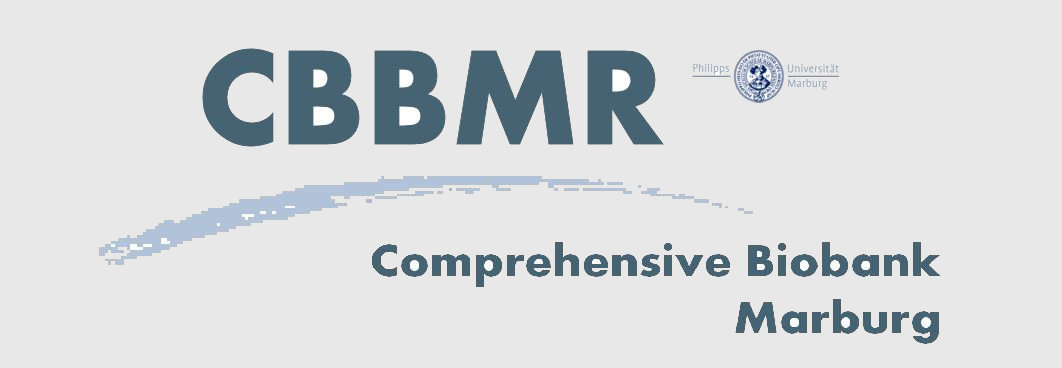All facilities of the Faculty of Medicine at the Philipps-University Marburg can use biosamples stored in CBBMR for study purposes. In cooperation with faculty members, external senders and partners can also carry out studies using CBBMR biosamples.
The use of the Core Facility CBBMR is regulated in the by-laws of CBBMR.
CBBMR offers three possibilities of use, which can be handled flexibly in a specific case:
1. General Biobank (Clinical Biobanking)
The General Biobank has a modular structure:
- Module 1: "Tumor diseases" Biobank of the Annelise Pohl Cancer Center CCC Marburg
- Module "SynChron" Biobank for chronic inflammatory diseases
- Module 3 "Healthy Volunteer Blood Bank"
The biosamples collected in the modules are made available to all researching members of the faculty against payment of a user fee. Prerequisite for use is a positive vote of the ethics committee of the Faculty of Medicine of the Philipps University of Marburg and the consent of the donor of the sample.
Samples will only be issued in pseudonymized form. Clinical data in Module 1 will be provided from the tumor documentation of the CCC Marburg. For Module 2, pseudonymized pathological findings can be provided against payment of a flat rate.
The use of samples from the General Biobank is subject to the payment of a user fee in accordance with the CBBMR cost regulations.

2. Establishment of study biobanks within the framework of approved projects
Within the framework of clinical and population-based studies and collaborative research, large quantities of biosamples are increasingly accumulating which are not analyzed ad hoc but have to be transferred to suitable storage. The quality-assured storage of study samples plays an increasingly important role in the successful implementation of national and international study projects. Since the approval of study projects by potential sponsors already depends on the sustainable quality of the sample storage, CBBMR offers the possibility for study teams to store sample materials in a standardized and quality assured way for a flat rate of costs.
A veto right of the respective research and/or consortium on this sample material ensures the exclusive use of the stored biosamples. Fast and flexible access for the study team is guaranteed at all times. The establishment of a project or study biobank is regulated in the CBBMR cost regulations. In the case of collaborative projects such as research groups, SFBs or other networks, CBBMR aims to acquire third-party funding directly.

3. Use of samples from retrospective sample collections
According to the statement of the National Ethics Council NER of 2004, retrospective samples taken before 2004 can be used for scientific research in anonymized form without the patient's consent. These retrospective FFPE samples can be given to study teams with the consent of the Institute of Pathology and, in the case of a positive vote of the Ethics Committee. Here, too, a flat-rate fee for use must be paid in accordance with the CBBMR cost regulations.
Biomaterialien der Gewebebank

Die Gewebebank von CBBMR hält Formalin-fixierte, paraffin-eingebettete und Fresh-Frozen-Gewebeblöcke bereit. Je nach anstehender Analyseart wird gemeinsam mit dem Nutzer festgelegt, in welcher Form Gewebeproben ausgegeben werden. Die Lagerung der Fresh-Frozen-Gewebsblöcke erfolgt bei -196°C über flüssigen Stickstoff, FFPE-Gewebeblöcke werden in gesicherten Spezialschränken bei Raumtemperatur und einer kontrollierten Feuchte gelagert.
Auf Wunsch des Nutzers können Tissue-Micro-Arrays (TMA) angefertigt werden. Ebenso bietet CBBMR eine Nukleinsäure-Extraktion mittels RNAEasy-Kit oder eine Nukleinsäurestabilisierung mittels RNA/DNA-later an. Die Kosten sind der Kostenordnung von CBBMR zu entnehmen.
Biomaterialien der Flüssigbank

Blut- und andere Flüssigproben werden in 0.7 ml Tubes zu 300 µl eingelagert und abgegeben. Alle Materialien werden in 2-D code-gelabelten Tubes gelagert, so dass bei Ausgabe ein Tubescanner entliehen werden muss. Die Lagerung der Probenaliquote erfolgt bei -80°C. Auf Wunsch können auch andere Kavitäten eingelagert und Trockenblutkarten aus einer Vollblutprobe angelegt werden. Wenden Sie sich bitte dafür direkt an CBBMR.
PBMC-Bank

CBBMR bietet die Bereitstellung von PBMC-Suspensionen an, deren Gewinnung auf der klassischen Dichtezentrifugation aus EDTA-, Citrat- bzw. Heparinblut oder der Gewinnung mittels CPT-Röhrchen (BD) beruht. Die Zellen werden zu 2ml-Aliquoten über flüssigen Stickstoff gelagert. Auf Wunsch kann die Zellzahl der Suspension eingestellt werden.
Kontrollblutbank
Für die Gewinnung von Normalblutproben führt CBBMR in regelmäßigen Abständen eine Sammlung bei freiwilligen Blutspendern durch. In Absprache mit CBBMR können projektspezifisch Freiwillige rekrutiert werden. Nehmen Sie bitte hierzu bei Bedarf Kontakt mit der Biobank auf.
Weitere Biomatrices

Wenn Sie weitere Biomaterialien für Ihre Studie benötigen, z.B. Effusionen, Stuhl oder Haarproben, können Sie sich direkt an CBBMR wenden. Gerne arbeiten wir mit Ihnen entsprechende Workflows und Verfahrensanweisungen aus. Nehmen Sie bitte hierzu bei Bedarf Kontakt mit der Biobank auf.
If you work at the faculty of Medicine of the Philipps-University or at the University Hospital Marburg, you can download the request form for samples here, fill it out and send it to info(at)cbbmr[dot]de. Please note in this case that the issue of biosamples can only take place after a positive vote of the ethics committee of the Faculty of Medicine of the Philipps-University of Marburg and with the consent of the sample sender. We will then check the stock and inform you immediately.
If you are not the sender of the desired biosample, please conclude a material transfer agreement after the sample material has been handed over.
If you would like to cooperate with us regarding prospective biomaterial acquisition, please contact the management of CBBMR directly.
External users should always contact the management of CBBMR directly.


- Consulting for the establishment of project biobanks
- Advice on the preparation of ethical proposals
- Tissue microarray: Creation of tissue punches from FFPE sample material and paraffin embedding
- Cytokine determination from body fluids using the multiplex bead array technique-CBA-Flex (BD)
- Cytokine stimulation tubes (non-specific LPS/ T-cell specific antiCD3/anti-CD28)
- Cell cultures: from autumn 2019, primary cell cultures of pancreatic and lung tumor tissue will be made available, and from 2020 a pancreatic and a lung organoid bank will provide further cultures. This includes the use of the organoid incubator CERO OLS for your purposes.
The costs can be found in the cost regulations.
Please use this form to apply for the use of biomaterials and services.
How is the feedback of research results and data provided by CBBMR based on biosamples and services?

If you use biosamples processed and provided by CBBMR in your study, this material transfer must be identified in a resulting publication. If scientific services were provided by CBBMR in the context of the study, we ask for co-authorship of scientific publications. If services and biosamples already established in CBBMR have been used by CBBMR in the study, please mention this in your acknowledgement independent from a probable co-authorship of a CBBMR member. In any case, the publication of research results, which have been produced with biosamples and services of CBBMR, should be reported back to CBBMR. We will publish the corresponding publications on our website and link to PubMed.


